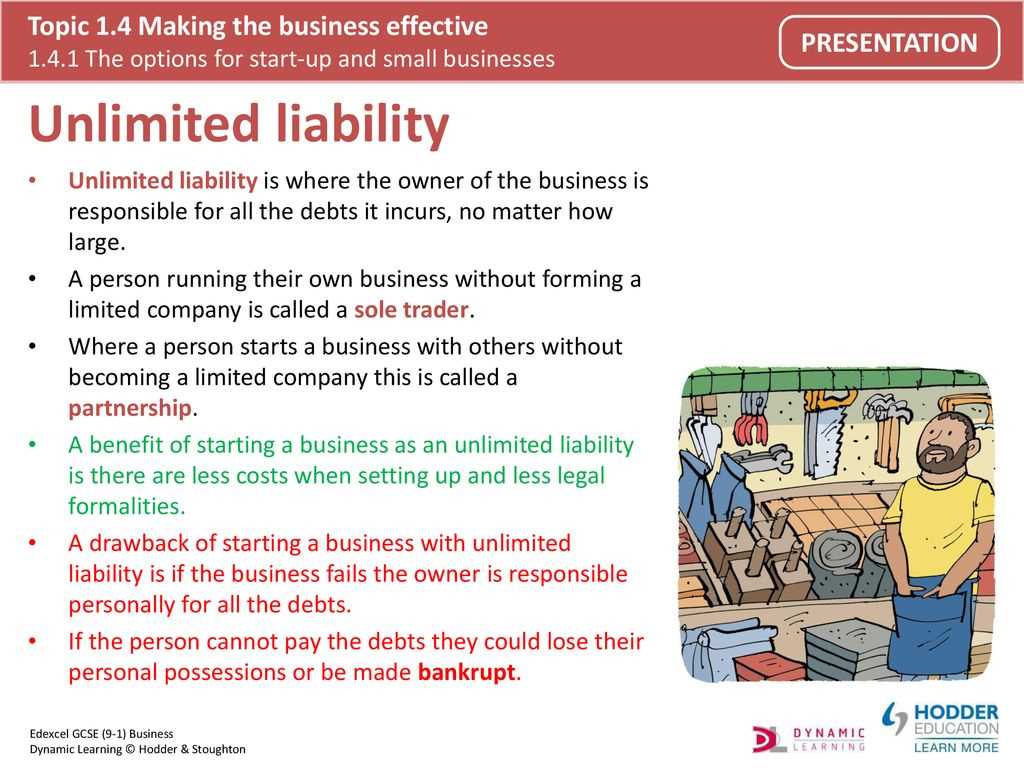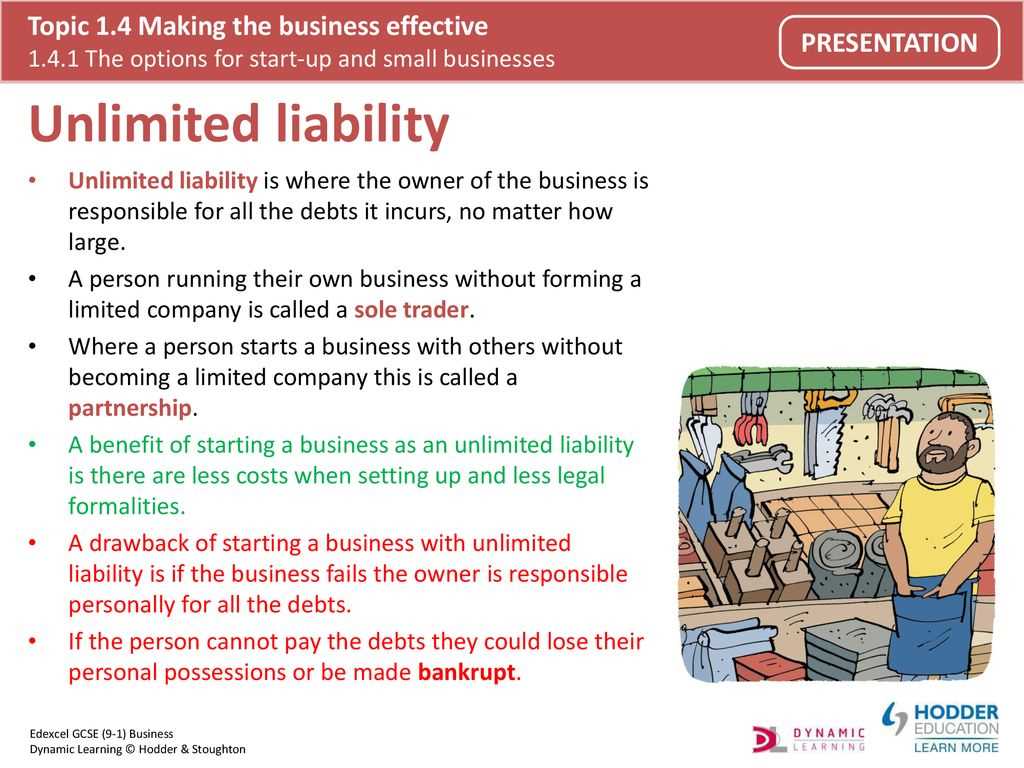What is Unlimited Liability?
Unlimited liability is a concept that applies to business owners and partners, where they are personally responsible for all the debts and obligations of their business. This means that if the business fails or incurs debts, the owners’ personal assets can be used to satisfy those obligations.
Definition and Explanation
Unlimited liability means that there is no limit to the financial responsibility of the business owners. Unlike limited liability, where the owners’ personal assets are protected, unlimited liability exposes the owners to the risk of losing their personal wealth.
When a business has unlimited liability, the owners are fully responsible for all the debts and legal obligations of the business. This includes loans, contracts, and any damages or liabilities that may arise from the business operations.
Implications and Risks

The main implication of unlimited liability is that business owners are personally liable for the debts of the business. This means that if the business cannot pay its debts, the owners may have to use their personal assets, such as savings, investments, or property, to satisfy those obligations.
This can be a significant risk for business owners, as it puts their personal wealth at stake. If the business fails or faces financial difficulties, the owners may face bankruptcy or financial ruin.
Unlimited liability also means that business owners may be held personally responsible for any legal issues or damages caused by the business. This includes lawsuits, fines, or penalties that may arise from the business operations.
Application of Unlimited Liability
Unlimited liability is most commonly found in small businesses, such as sole proprietorships and partnerships. These types of businesses often have fewer resources and limited access to financing, making it difficult to establish limited liability protections.
In contrast, larger businesses, such as corporations, typically have limited liability. This means that the owners’ personal assets are protected, and they are not personally responsible for the debts and obligations of the business.
It is important for business owners to understand the implications and risks of unlimited liability before starting a business. They should carefully consider the potential financial consequences and explore options for mitigating the risks, such as obtaining business insurance or forming a limited liability company.
Definition and Explanation
Unlimited liability refers to the legal obligation of a business owner or partner to be personally responsible for all debts and liabilities incurred by the business. In other words, if the business fails to meet its financial obligations, the owner’s personal assets can be used to satisfy those debts.
This concept is commonly found in sole proprietorships and partnerships, where the business and its owners are considered to be one and the same. Unlike corporations or limited liability companies (LLCs), which offer limited liability protection to their owners, businesses with unlimited liability expose their owners to significant financial risks.
How Does Unlimited Liability Work?
For example, if a sole proprietorship fails to repay a loan or faces a lawsuit, the owner’s personal assets can be used to satisfy the debt or judgment. Similarly, in a partnership, each partner is individually liable for the partnership’s debts, and creditors can go after their personal assets to recover what is owed.
Unlimited liability can have serious implications for business owners, as it puts their personal financial security at risk. If the business incurs significant debts or faces legal issues, the owner may lose their personal savings, property, and even their home.
Advantages and Disadvantages of Unlimited Liability
While unlimited liability may seem like a disadvantage for business owners, there are some potential advantages to this structure. For example, it can make it easier for small businesses to obtain financing, as lenders may be more willing to extend credit knowing that the owner’s personal assets are at stake.
However, the disadvantages of unlimited liability often outweigh the benefits. The main drawback is the personal financial risk that business owners face. They are personally responsible for all debts and liabilities, even if they were not directly involved in the business’s actions that led to those debts.
Additionally, unlimited liability can make it difficult for business owners to attract partners or investors, as potential partners may be hesitant to take on personal liability for the business’s debts. It can also limit the growth potential of the business, as owners may be reluctant to take on additional risks.
Unlimited Liability in Business
Unlimited liability is a concept that applies to certain business structures, such as sole proprietorships and partnerships. It refers to the legal obligation of business owners to be personally responsible for all debts and liabilities of the business, without any limit on the amount they can be held liable for.
Under unlimited liability, if a business fails to meet its financial obligations, the owners’ personal assets, including their savings, investments, and even their homes, can be used to satisfy the debts. This means that the owners have unlimited personal liability for the business’s debts and obligations.
Implications and Risks
Furthermore, unlimited liability can also affect the personal lives of business owners. The stress and pressure of being personally liable for the business’s debts can take a toll on their mental and emotional well-being.
Application of Unlimited Liability
Unlimited liability is most commonly found in small businesses, such as sole proprietorships and partnerships. These business structures often have fewer resources and less access to capital, making it more difficult to separate personal and business assets.
In contrast, larger businesses, such as corporations, typically have limited liability. This means that the owners’ personal assets are protected, and their liability is limited to the amount they have invested in the business.
It is important for business owners to understand the implications of unlimited liability and to consider alternative business structures, such as forming a limited liability company (LLC) or incorporating, which can provide personal asset protection and limit liability.
Implications and Risks

This level of risk can be particularly concerning for small business owners who may have invested their personal savings or taken out loans to start their business. In the event of a business failure or financial hardship, they could potentially lose everything they have worked for.
Another implication of unlimited liability is the potential for personal bankruptcy. If a business owner is unable to meet their financial obligations, they may be forced to declare bankruptcy. This can have long-lasting effects on their personal and professional life, making it difficult to secure loans or start a new business in the future.
It is important for business owners to carefully consider the implications and risks of unlimited liability before choosing this business structure. They may want to explore alternative options, such as forming a limited liability company (LLC) or incorporating, which can provide personal asset protection and limit their liability.
Application of Unlimited Liability
Unlimited liability is a concept that applies to various business structures, including sole proprietorships, partnerships, and some types of corporations. It is important to understand how unlimited liability can be applied in different business situations.
One of the main applications of unlimited liability is in the context of sole proprietorships. In a sole proprietorship, the business is owned and operated by a single individual. This means that the owner is personally responsible for all debts and obligations of the business. If the business fails to meet its financial obligations, the owner’s personal assets can be used to satisfy those debts.
Unlimited liability can also apply to certain types of corporations, such as general partnerships and limited partnerships. In a general partnership, all partners have unlimited liability for the debts and obligations of the business. In a limited partnership, there are both general partners, who have unlimited liability, and limited partners, who have limited liability.
It is important for business owners to consider the implications and risks of unlimited liability when choosing a business structure. While unlimited liability can provide certain benefits, such as simplicity and flexibility, it also exposes the owner’s personal assets to potential financial risks. Therefore, it is crucial to carefully weigh the pros and cons before deciding on a business structure.
Unlimited Liability in Different Business Structures
Sole Proprietorships
In a sole proprietorship, the business and the owner are considered one and the same. This means that the owner has unlimited personal liability for the debts and obligations of the business. If the business fails or incurs significant debts, the owner’s personal assets can be used to satisfy those obligations.
Partnerships
In a partnership, two or more individuals share the profits, losses, and liabilities of the business. In a general partnership, each partner has unlimited personal liability for the debts and obligations of the partnership. This means that if the partnership cannot meet its obligations, the partners’ personal assets can be used to satisfy those debts.
Limited partnerships, on the other hand, have both general partners and limited partners. General partners have unlimited liability, while limited partners have limited liability and are not personally responsible for the debts and obligations of the partnership beyond their initial investment.
Corporations
Most corporations have limited liability, which means that the shareholders’ personal assets are generally protected from the debts and obligations of the corporation. However, there are certain types of corporations, such as sole proprietorships and partnerships, that can have unlimited liability.
For example, a sole proprietorship corporation is a corporation where a single individual is the sole shareholder and has unlimited personal liability for the corporation’s debts and obligations. Similarly, a partnership corporation is a corporation where the shareholders are partners in a partnership and have unlimited personal liability.

Emily Bibb simplifies finance through bestselling books and articles, bridging complex concepts for everyday understanding. Engaging audiences via social media, she shares insights for financial success. Active in seminars and philanthropy, Bibb aims to create a more financially informed society, driven by her passion for empowering others.
